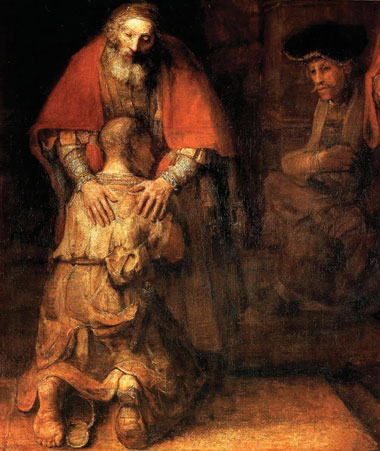 Confession. Not a popular word! Many would agree that “confession is good for the soul.” But engaging in confession is not something many of us regularly do. Discipline isn't a popular word either. We all know we need it. But living a disciplined life—whether it relates to eating, exercise or use of time—is difficult. This leads me to the simple equation: Discipline + confession = something we would rather avoid.
Confession. Not a popular word! Many would agree that “confession is good for the soul.” But engaging in confession is not something many of us regularly do. Discipline isn't a popular word either. We all know we need it. But living a disciplined life—whether it relates to eating, exercise or use of time—is difficult. This leads me to the simple equation: Discipline + confession = something we would rather avoid.
Yet when I went online and Googled the word “confession,” I found 16 million links! One site offers “daily confession,” while another promises “absolution online.” There is even a web page designed “for anyone to anonymously confess to anything.” Its author observes: “It actually feels kind of good to know that someone will read it.”
What is going on? Is confession just a part of the “feel good society” where the highest aim is for individual happiness and fulfilment? If we need to get rid of our negative feelings or guilt, we just dump them into the laps of cyberspace strangers? This view of confession focuses on us and our need to “confess to anything” and to feel “kind of good.” It is time for us to reclaim the Christian roots of confession, where the centre of attention is a God who we can know and meet.
“Against You … I Have Sinned”
First we need to clear away some of the “bad press” that has built up around the Christian notion of confession. As author Maxine Dunnam notes, confession is not a morbid discipline or a grovelling before a reluctant God. It is not an act of fear before an angry and vengeful God. Instead, confession is a positive word in biblical understanding. It's an aspect of our worship.
Like the Prodigal Son, we approach God with our rehearsed confession, only to find him running with arms wide open, ready to embrace us
The Salvation Army's Called to be God's People, produced by the International Spiritual Life Commission, says, “Praying, we engage in a unique dialogue that encompasses adoration and confession, petition and intercession.” Confession is a natural part of our ongoing dialogue with our Creator. It is responding with truth to a God who is holy. As one author has said, confession enables us to see ourselves as God sees us. It is part of honestly sharing who we are as we talk with him.
The classic example of this is Psalm 51, where King David pleads for mercy and honestly lays out his sinfulness before the Lord. While he has obviously hurt other people by his sin, he confesses to God, “Against you, you only, have I sinned and done what is evil in your sight” (v 4). Further on, he pleads not to be cast away from God's presence (v 11).
You see, sin isolates us—but confession connects us. David confessed because he deeply desired a relationship with God, who he knew was merciful and offered forgiveness. David had perfect freedom with God, so his dialogue included not only magnificent hymns of praise and adoration but prayers of honest confession and deep repentance.
Saint John Chrysostom expressed it well: “Repent of your sin … for here is the Physician, not the judge; here one is not investigated but receives remission of sins.” Coming before a God like this is surely coming to a mercy seat.
Return of the Prodigal
Jesus showed us what confession looks like in Luke 15:11-32. The story of the Prodigal Son is one we can identify with on many levels. We, too, often think we know what is best and go our own way. But when we hit rock bottom and realize how much we are missing out on because of our lost and separated state, we can come back toward our loving God. We approach him with our rehearsed confession, only to find him running out with arms wide open, ready to embrace us.
As the 10th-century monk John the Faster wrote, “Let us accept from God the repentance that heals us. For it is not we who offer it to him, but he who bestows it upon us.” Confession is about God more than it is about us. We can only come to him in confession because he invites us. “If we confess our sins, he is faithful and just and will forgive us our sins and purify us from all unrighteousness” (1 John 1:9). Sin separates and isolates us. Confession connects us again with a loving heavenly Father who deeply desires to have a relationship with us.
Confession is such an extravagant gift from God. We find it so difficult to forgive those who wrong us. We hold grudges. We simmer, fume and relive the wrongs said and done. We hang on to the bitterness. So it is beyond our comprehension that God is so eager to forgive, heal and restore us. But we see this action of God over and over again in the Old Testament. In spite of the “great guilt and many sins” of Israel, God tells them, “I will restore you to health and heal your wounds.… I have loved you with an everlasting love; I have drawn you with unfailing kindness. I will build you up again” (Jeremiah 30:15, 17; 31:3-4).
In Jesus' story, this healing and building up turns into a party for the Prodigal Son as he is welcomed home by his father. The words of forgiveness are not spoken but enacted—a ring on the finger that has fed pigs; sandals on bare, tired feet; a fattened calf killed and roasted for a feast of celebration. This is what healing and building up again look like when we confess to God who created us. In spite of our sinfulness, God offers redemption and fullness of life through Jesus Christ, his Son. Why would we not want to engage in prayers of confession as well as adoration, repentance and praise?
Forgiving Oneself
Despite all this, the reluctance to confess can be strong. I remember the young woman well. She asked to see me in my office and I had no idea what was on her mind. We met several times and I kept wondering what the “real issue” was. Each time we met she seemed to approach what she wanted to say … then backed off. Finally, she confessed a sin that had been eating away at her for a long time. She couldn't believe that God would forgive her, because she couldn't forgive herself. Talking about God's forgiveness didn't seem to be enough. I had to speak words of Scripture to her as if God were addressing her personally. It took time until she allowed God's mercy and grace to penetrate through all the layers built up over the years. Her experience of freedom was gradual, but it began to change her.
The Psalms deal with the rawness of life, including our sinfulness. In Psalm 32, the writer realizes that failing to acknowledge our sin has physical consequences. It feels like our bones are wasting away, or as if a heavy hand is pushing down on us. It can make us restless and sleepless and drain us of energy. Sin isolates us. But, as the psalmist realizes, confession connects us again: “Then I acknowledged my sin to you and did not cover up my iniquity… and you forgave the guilt of my sin” (v 5). The Great Physician heals us and reconnects us with God and with ourselves.
Practising the Discipline
If confession is a natural part of prayer and is a positive, honest expression of ourselves before God, what does “the discipline of confession” look like? Richard Foster describes a spiritual discipline as an intentional act meant to place us before God so that he can change us. The discipline of confession does not need to wait until we know we have committed some obvious wrong. Rather, it involves taking time in prayer to sit quietly before God, honest and vulnerable. We can ask him to reveal to us anything that might separate us from his love, to cleanse and purify us and to restore us to full joy. Some have called this the Prayer of Examen—moments taken at the end of the day to reflect on God and ourselves and respond to God honestly in light of what comes to mind.
Another way of exercising the discipline of confession is by using our Salvation Army songbook. The section on the Life of Holiness (songs 407-555) has some honest prayers that we can pray. For example:
Saviour, if my feet have faltered
On the pathway of the cross,
If my purposes have altered
Or my gold be mixed with dross,
O forbid me not thy service,
Keep me yet in thy employ,
Pass me through a sterner cleansing
If I may but give thee joy!
(Albert Orsborn, SASB 522)
In addition, there are some thoughtfully written prayers of confession that have been part of the Christian tradition for centuries that we can make part of our discipline of prayer. Here is one example:
Most merciful God, we confess that we have sinned against you
In thought, word and deed, by what we have done
And by what we have left undone.
We have not loved you with our whole heart;
We have not loved our neighbours as ourselves.
We are truly sorry and we humbly repent.
(The Book of Alternative Services,
Anglican Church of Canada, 1988)
Confession contributes to our personal prayer by opening up the lines of communication with God. But there are times when confession needs to move into the realm of the whole community, as so often happened in Israel. Prophets like Ezra and Nehemiah called the community to repent “because our sins are higher than our heads and our guilt has reached to the heavens” (Ezra 9:6). As our commitment to social justice deepens, we will become increasingly aware that our silence and lack of action has allowed racism, sexism, human trafficking and other social evils to continue unabated. As we experienced through the resources for the Day of Prayer Against Human Trafficking, we need to stand before God and confess our neglect and indifference. Following God's forgiveness we will find him opening doors of opportunity for our corps and other ministry units.
Practising the discipline of confession leads to a new awareness of God's extravagant grace. Where sin isolates, confession connects. Brother Lawrence described it like this: “I confess to [God] all my wickedness … I ask this forgiveness, I abandon myself in his hands…. The King, full of mercy and goodness, very far from chastising me, embraces me with love, makes me eat at his table, services me with his own hands, gives me the keys of his treasures… in a thousand and a thousand ways, he blesses me.”
Photo: Rembrandt van Rijn, The Return of the Prodigal Son, c.1662









Comment
On Monday, July 1, 2019, Laura Nowick said:
On Tuesday, November 30, 2010, George in Missouri said:
Thank you for this inspirational discussion. It renews my faith in my fellow Christians.
On Monday, March 23, 2009, Michael said:
Leave a Comment